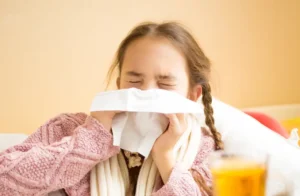How can you help kids learn to clean their noses? Michal Olivero, a certified Montessori instructor, explains.

Runny nose, snot, runny nose. How much liquid can a kid’s nose have?! It happens mainly in the winter, the liquid won’t dry up and you’re constantly wiping your kids’ noses. Before kids learn to use tissue, they use their shirts for wiping which leads to lots of stained shirts.
There’s definitely another way. Michal Olivero, a certified Montessori instructor, explains that at the heart of the Montessori approach is the idea that kids learn naturally and independently through experiences in the environment.
So if you let kids experiment on their own doing different activities they’ll learn quickly and efficiently. Preschool kids learn through their senses and not through abstract concepts. They won’t learn by listening to you, no matter how much you explain yourself. Experience is the best teacher.
Kids have a natural tendency for independence. They want to do things on their own and feel capable, and they like work since it makes them feel like they’re contributing and being part of their environment.
When you allow kids to do things on their own, you adapt the learning to the structure of the brain and meet their basic needs. Also, Maria Montessori developed an entire field of study called life skills, and within this field is a sub-field related to self-care, which is done through practice.
So, what does all this have to do with nose cleaning?
To teach kids to blow noses on their own, you must let them experiment. Place a pack of tissues, a small garbage can and a mirror on an accessible shelf, and show them how you blow your own nose and then let them try it. It will take time and practice, but in the end you’ll see that it works.
What does a demo look like?
Since kids watch and imitate you, show them this method: take a tissue, close one nostril and blow. Then do the same with the other nostril. When finished, throw the tissue in the trash.
What do you do when you still have to wipe their noses?
Treat the whole subject of body care as sacred. Your child’s body is the most personal and sacred thing and so is yours. Pay attention. You gave birth to them, but they have bodily autonomy. Use respect when caring for them. Tell them you’re about to clean their noses. Surprising them may be hurtful.
If it seems hopeless to you, give it a chance. If you behave this way naturally, you’ll occasionally discover that there’s more cooperation and less resistance. Let kids experiment on their own and you’ll see how capable they are.
This article was written in partnership with the JAMA parenting app.
